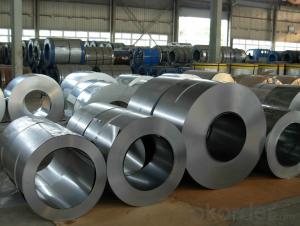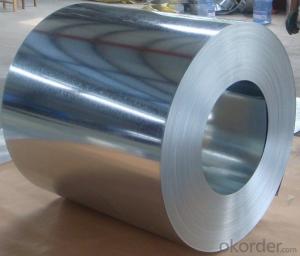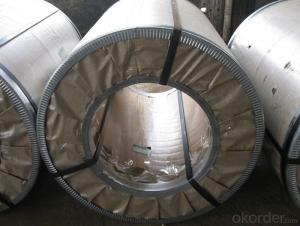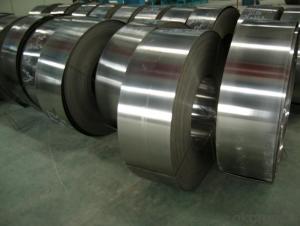Cold Rolled Steel Coil with Prime Quality various sizes and Lowest price
- Loading Port:
- Shanghai
- Payment Terms:
- TT OR LC
- Min Order Qty:
- 100 m.t.
- Supply Capability:
- 10000 m.t./month
OKorder Service Pledge
OKorder Financial Service
You Might Also Like
1.Structure of Cold Rolled Steel Description:
The raw material of cold rolled steel coil/sheet is high quality hot rolled product, and after pickling continuous rolling,. Along with it many kinds of new technology and new process of global cold rolling production have been applied. degreasing, annealing,skin pass,slitting and cut to length line etc
Coil ID:508/610mm
5.FAQ of Cold Rolled Steel
We have organized several common questions for our clients,may help you sincerely:
1.How about your company?
A world class manufacturer & supplier of castings forging in carbon steel and alloy steel,is one of the large-scale professional investment casting production bases in China,consisting of both casting foundry forging and machining factory.
• Good visual effect
3.Cold Rolled Steel Images
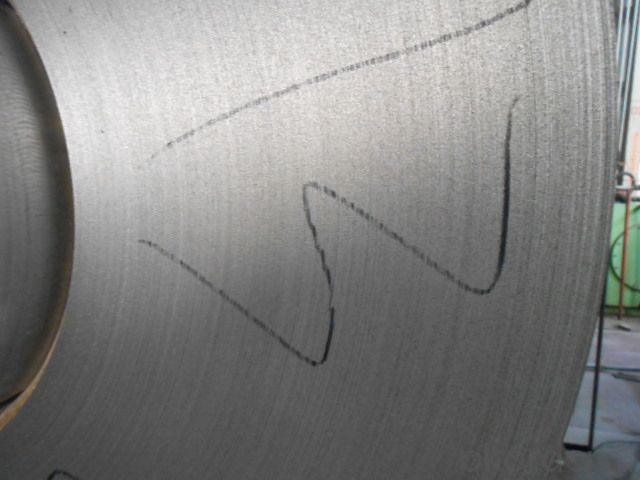
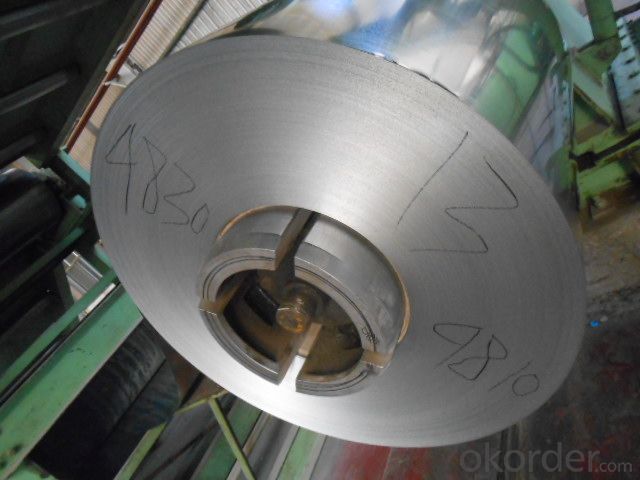
4.Cold Rolled Steel Specification
Standard:AISI,ASTM,DIN,GB,JIS,JIS G3302 ASTM 653M EN10142
Thickness: 0.16mm~1.5mm,0.16-1.5mm Width: 1250,600-1250mm Coil weight:3-12 MT Grade: Q195~Q345
2.Main Features of the Cold Rolled Steel:
• High strength • Good formability • W
- Q:What are the common defects found in uncoiled steel coils?
- Some common defects found in uncoiled steel coils include edge waves, center buckles, coil breaks, surface defects such as scratches or dents, and variations in thickness or width.
- Q:What are the common welding defects in steel coils?
- There are several common welding defects that can occur in steel coils during the welding process. These defects include: 1. Porosity: This is characterized by small holes or voids in the weld metal, which are caused by gas entrapment during the welding process. It can weaken the weld and make it more susceptible to corrosion. 2. Lack of fusion or incomplete penetration: This defect occurs when there is inadequate fusion between the base metal and the weld metal, or when the weld metal does not fully penetrate the joint. It can result in a weak or brittle weld. 3. Cracks: Cracks can occur in the weld metal or in the heat-affected zone (HAZ) of the base metal. They can be caused by factors such as high stress levels, improper cooling, or inadequate preheating. Cracks can significantly reduce the strength and integrity of the weld. 4. Undercutting: Undercutting is a groove or depression that forms at the toe of the weld due to excessive melting of the base metal. It weakens the weld and can lead to stress concentration and potential failure. 5. Excessive spatter: Spatter refers to the small droplets of molten metal that are expelled from the welding arc and can land on the surface of the steel coil. Excessive spatter can result in a rough or uneven surface finish and may require additional cleaning or grinding. To minimize these welding defects in steel coils, it is important to ensure proper weld preparation, including cleaning and removing any contaminants from the surface of the steel. Additionally, using the correct welding parameters, such as appropriate heat input and travel speed, can help to minimize defects. Regular inspection and quality control measures can also help to identify and address any defects before they become more serious issues.
- Q:What are the different types of steel coil packaging machines?
- There are several different types of steel coil packaging machines available in the market. These machines are designed to efficiently and effectively package steel coils for storage, transportation, or distribution. Some of the different types of steel coil packaging machines include: 1. Automatic steel coil packaging machine: This type of machine is fully automated and can handle high-volume packaging requirements. It uses advanced technology to wrap the steel coils with a protective layer of film or paper. The machine can also apply strapping or stretch film to secure the coils during transportation. 2. Semi-automatic steel coil packaging machine: This machine requires some manual intervention to load and unload the steel coils. It is suitable for medium to high-volume packaging needs and offers a good balance between automation and cost-effectiveness. The machine typically uses a combination of wrapping, strapping, and shrinking techniques to package the coils. 3. Vertical steel coil packaging machine: This type of machine is designed specifically for packaging vertical steel coils. It can wrap the coils with a layer of film or paper, and then apply strapping or stretch film to secure them. The vertical design allows for easy loading and unloading of the coils. 4. Horizontal steel coil packaging machine: This machine is ideal for packaging horizontal steel coils. It can wrap the coils with a protective layer of film or paper, and then apply strapping or stretch film to secure them. The horizontal design ensures easy loading and unloading of the coils. 5. Customized steel coil packaging machine: Some manufacturers offer customized packaging solutions based on specific requirements. These machines can be tailored to accommodate different coil sizes, shapes, and packaging materials. They are designed to provide maximum flexibility and efficiency in the packaging process. In summary, the different types of steel coil packaging machines include automatic, semi-automatic, vertical, horizontal, and customized machines. The choice of machine depends on factors such as packaging volume, coil orientation, and specific requirements of the steel coils being packaged.
- Q:How are steel coils processed and shaped into different products?
- Steel coils are processed and shaped into different products through a series of manufacturing techniques. First, the coils are uncoiled and straightened to remove any deformities. Then, they go through processes like cutting, slitting, or shearing to achieve the desired width and length. Next, the steel is shaped using techniques like rolling, bending, or stamping to create specific profiles, such as sheets, plates, or tubes. Additionally, various heat treatments and surface finishes can be applied to enhance the strength, durability, and appearance of the steel products. Overall, a combination of mechanical, thermal, and chemical processes is employed to transform steel coils into the wide range of products we see in industries like construction, automotive, and manufacturing.
- Q:Can steel coils be coated with chrome?
- Yes, steel coils can be coated with chrome through a process known as electroplating.
- Q:does anyone out there know where to get a good deal on a pedal steel guitar? i am from northern indiana and i'm willing to travel some if i have to.i am just getting into pedal steel guitar and i really don't have any idea what i need. i don't know how to play a guitar (i do know how to play the piano and the drums) at all but i want to learn to play the pedal stell guitar and i can't do that without getting one first so, if anyone can help me out i would greatly appreciate it! :o)
- I agree with everything that Lester said. Another thought is to consider starting on a lap steel guitar rather than a pedal steel - its related, a little easier to learn on, and less expensive. Once you get proficient on the lap steel, you can move up to the pedal steel. Good luck!
- Q:so why shouldn't one use a steel cased 223 in an ar15?
- Steel cased ammo doesn't obturate (expand against the chamber walls) when fired as well as brass cased ammo does. This allows carbon to build on the chamber walls. Leading to failure to extract. But if you can get steel cased ammo for cheap, shoot it up! Just have a cleaning rod with when you shoot. If tapping the butt on the ground doesn't dislodge the spent case, push it out with the rod. Be sure to use a chamber brush when you clean your rifle after shooting steel cased ammo. I would never use steel cased ammo for defensive purposes in an AR however. The occasional failures to extract make it a bad idea. It's plinking ammo only.
- Q:How can I judge the quality of steel?
- The quality of the alloy can be very well be judged by its appearance and lustrous surface. The more luster on the surface the more refine will the steel be. To judge its tenacity and endurance, the alloy can be subjected to a series of procedures involving stress and shock. There are many more scientific methods of measuring the quality of the alloy such as texture measurement technique etc are also employed. In layman’s term the quality can be measured by the hardness of surface, brightness and smoothness of the surface and absence of any depressions or troughs.
- Q:How do steel coils contribute to the water and wastewater industry?
- Steel coils contribute to the water and wastewater industry by being used in the construction of pipes, tanks, and other infrastructure. These coils provide strength, durability, and corrosion resistance, ensuring the integrity and longevity of water and wastewater systems. Additionally, steel coils are often utilized in the manufacturing of water treatment equipment and machinery, helping to improve the efficiency and effectiveness of the water and wastewater treatment processes.
- Q:How are galvanized steel coils different from regular steel coils?
- Galvanized steel coils are different from regular steel coils as they are coated with a layer of zinc to prevent corrosion and rust formation. This zinc coating acts as a protective barrier, increasing the longevity and durability of the steel coils, especially in harsh environmental conditions.
1. Manufacturer Overview |
|
|---|---|
| Location | |
| Year Established | |
| Annual Output Value | |
| Main Markets | |
| Company Certifications | |
2. Manufacturer Certificates |
|
|---|---|
| a) Certification Name | |
| Range | |
| Reference | |
| Validity Period | |
3. Manufacturer Capability |
|
|---|---|
| a)Trade Capacity | |
| Nearest Port | |
| Export Percentage | |
| No.of Employees in Trade Department | |
| Language Spoken: | |
| b)Factory Information | |
| Factory Size: | |
| No. of Production Lines | |
| Contract Manufacturing | |
| Product Price Range | |
Send your message to us
Cold Rolled Steel Coil with Prime Quality various sizes and Lowest price
- Loading Port:
- Shanghai
- Payment Terms:
- TT OR LC
- Min Order Qty:
- 100 m.t.
- Supply Capability:
- 10000 m.t./month
OKorder Service Pledge
OKorder Financial Service
Similar products
New products
Hot products
Related keywords
